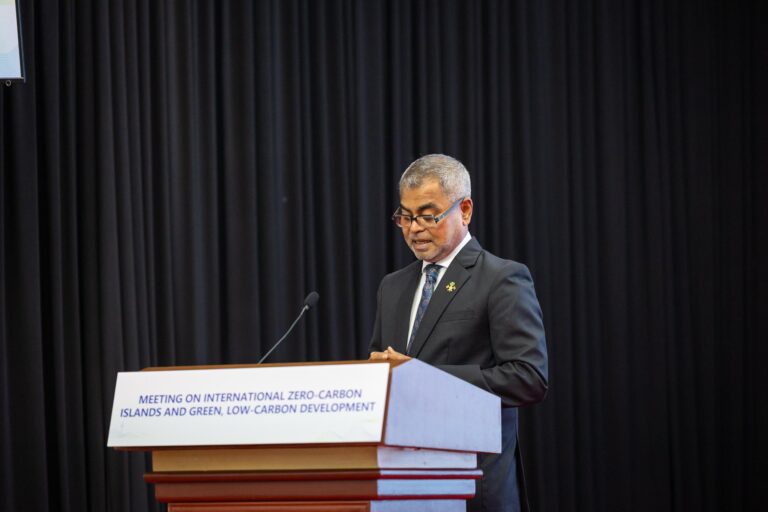Malé, Maldives – The Maldives is making significant progress in its efforts to reduce carbon emissions and combat climate change, according to Minister of Tourism and Environment, Thoriq Ibrahim.
Speaking at the International Zero Carbon Islands and Green, Low-Carbon Development Conference on Monday, Minister Thoriq highlighted a series of ongoing measures to cut emissions and transition towards renewable energy. He revealed that the government aims to reduce carbon emissions to 1.52 million tonnes by the end of this year.
“The installation of solar energy systems across various islands is one of the key steps we’re taking,” said the Minister. “We plan to increase our investments in this area and continue identifying additional ways to lower harmful emissions.”
The conference, held in collaboration between the Maldives and China, focuses on boosting renewable energy use and promoting low-carbon development. China has played a supportive role, providing training programs and education opportunities for Maldivians in renewable energy fields, including scholarships that cover tuition, accommodation, and travel.
Minister @thoriqibrahim attended the ‘International Zero-Carbon Islands and Green Low-Carbon Development Exchange Conference’ co-hosted by the Ministry and the Yantai Municipal People’s Government.
Speaking at the conference, Minister highlighted the Maldives’s commitments… pic.twitter.com/meXA1BI8Ss— Ministry of Tourism and Environment (@MoTmv) May 12, 2025
Minister Thoriq emphasized that these efforts are part of a broader national strategy to preserve the Maldives’ vulnerable environment. The government has rolled out multiple initiatives focused on renewable energy expansion and sustainable waste management to safeguard the country’s delicate ecosystem.
Under President Dr Mohamed Muizzu’s administration, the Maldives has committed to ambitious environmental goals. At the beginning of 2024, the nation’s installed renewable energy capacity stood at 53 Megawatts, accounting for only four percent of the country’s energy consumption. However, within just one year, the government has added 15 Megawatts of renewable energy, pushing the total installed capacity past 70 Megawatts.
The administration now aims to increase renewable energy usage to 33 percent of national consumption within the next five years a dramatic leap from previous figures and a sign of the country’s intensified commitment to climate action.


